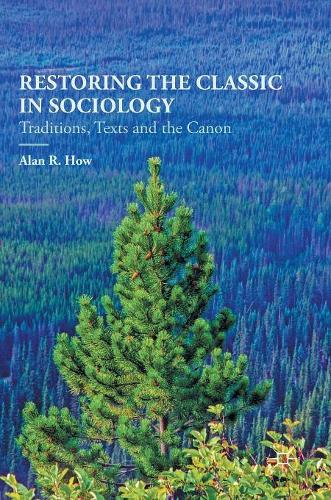
Restoring the Classic in Sociology: Traditions, Texts and the Canon
(Hardback, 1st ed. 2016)
Publishing Details
Restoring the Classic in Sociology: Traditions, Texts and the Canon
By (Author) Alan R. How
Palgrave Macmillan
Palgrave Macmillan
11th July 2016
1st ed. 2016
United Kingdom
Classifications
Tertiary Education
Non Fiction
Social and political philosophy
Philosophy: epistemology and theory of knowledge
Philosophical traditions and schools of thought
301.01
Physical Properties
Hardback
260
Width 148mm, Height 210mm
4501g
Description
This book demonstrates that classical sociology is essential to cutting-edge debates in the contemporary social sciences. It has become fashionable to play down the importance of the classic text in sociology and critique the ideas of Weber, Marx and Durkheim as ideologically outdated. The author mounts a strong challenge to this view, criticising such notions as de-traditionalization, structuration and postmodernism, emphasizing instead the relevance of habit, re-traditionalization, and social integration across time. Arguing that sociology has eliminated the importance of the past, history, and tradition in favour of the transience of the present, he revisits the Habermas-Gadamer debate to argue that tradition is the ground of the classic, and the classic something that must prove itself anew in subsequent situations. He uses the work of Durkheim, Simmel and Weber to illustrate this process. Making a distinction between classic and canon which parallels that between agency and structure, he allows the reader to appreciate the separate value of both. This major contribution to the field is essential reading for scholars and students of sociology and social theory.
Reviews
Presenting an argument that brings many voices into the conversation while relying in particular on Hans-Georg Gadamer, the book is engaging and full of insights . Summing Up: Recommended. Graduate students/faculty. (P. Kivisto, Choice, Vol. 54 (6), February, 2017)
Author Bio
Alan R. How isSenior Lecturer at the University of Worcester, UK.
